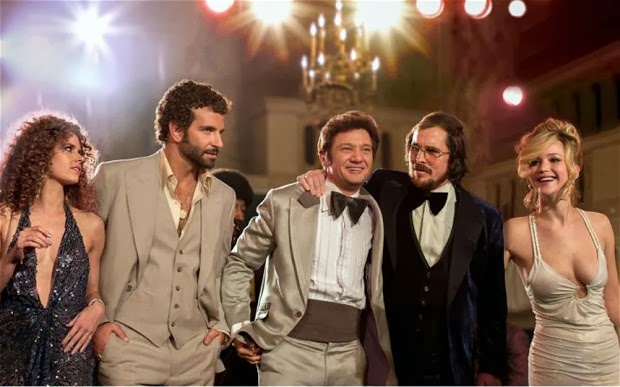2014: awards season
American Hustle has
been nominated for ten Oscars and Baftas, as well as seven Golden Globes (three
wins), two Screen Actors Guild awards (winning best ensemble) and a host of
others. It’s still not entirely clear why.
Maybe because of its look? The film begins with a
dishevelled Christian Bale painstakingly glueing on a hairpiece, and
fashion-wise it boldly continues in this vein with all manner of alarming
coiffures, ill-fitting suits, optimistic dresses and many other aesthetic
atrocities. David O Russell and his production designers have clearly had a
ball recreating the Seventies in all its shambolic glory and the actors lap it
up too. But it surely can’t just be down to spectacle or else all manner of
terrible films would be up for gongs too.
Perhaps it’s the story. Con artist capers are a Hollywood
mainstay and usually guarantee audience engagement thanks to the twists and
turns. Hustle’s plot keeps expanding as
Bale and Amy Adams’s small-time swindlers, once they fall into the clutches of
of Bradley Cooper’s eager-beaver detective, find themselves increasingly out of
their depth when Cooper’s ambitions start to involve prominent politicians and,
inevitably, mobsters. There’s also a love triangle plot between the three leads,
with alliegances and affections shifting around, and complicated further by the
ever-impressive Jennifer Lawrence as Bale’s brassy missus.
However, the character stuff tends to get in the way of events
at times, the shifts in focus derailing and bloating the film. It’s hard to become
overly attached to these flawed people, so when they were fishing for sympathy
I was really just waiting for the plot to move forward.
The dialogue never quite reaches blow-away levels either.
The best it gets are the conversations revolving around ice-fishing between
Cooper and his harassed boss (Louis CK on good form); elsewhere the wry moments
(many involving Lawrence) don’t quite come consistently enough.
Maybe it’s down to the directing? As noted, Russell must
have had fun making Hustle – perhaps
a bit too much, as the overall mood is one of indulgence. What he does well is
capturing fine details – his camera is unafraid to zero in on the characters’
physical imperfections as well as the period gaudiness. It sounds a bit silly
to describe this as brave on his and the cast’s part, but this is Hollywood
we’re talking about.
So then, is the acting attracting all the awards? No doubt
this is solid all-round, with the supporting cast like Jeremy Renner all
contributing their share. Bale completely disappears into his role, one of
those brillaintly chameleon-like actors who you nonetheless want to take to one
side and explain that extreme weight gain/loss isn’t all that necessary, what
with the state of prosthetics and CGI these days. Cooper is effective at being
a bit of a jerk for a change, and Adams bares if not all then the vast majority
of herself for her art, and essays an English accent to boot.
Perhaps the main reason is that David O Russell appears to
have hit on an award-friendly formula, making mainstream-friendly films with an
indie sensibility that attract a reliably starry stable of actors. Hustle isn’t a brilliant film by any
stretch of the imagination, but gongs have been won by stuff that’s an awful
lot worse. Not bad for a guy who not so long ago was mostly famous for the
impenetrable I Heart Huckabees and for twatting George Clooney (allegedly).
The reality, as helmed by Steve McQueen, is about as far
removed from that theoretical schmaltz-fest as you could imagine. McQueen does
not do half-measures. His third film is as uncompromising as his earlier works,
only even more brutal in its depictions of a corrupt and depraved ideology.
If you somehow aren’t aware of the story by now, Solomon
Northup was a free black man living in Upstate New York until one night in 1841
when, with his family away, he was lured to Washington DC with the promise of work
in a touring show, only to be drugged during a night on the booze. He then
experienced the hangover to end them all – 12 years of servitude, passed from
owner to owner like a piece of meat, and suffering all manner of degradations
along the way.
Even if you didn’t know that McQueen was (and still is) an
artist, you would have your suspicions after watching his films. Not a frame is
wasted here, and of the many poetic images that stay with the viewer long
afterwards, plenty are simple yet beautiful establishing shots – a paddle
steamer chopping through the seas, or a worm inching its way along a cotton plant.
The centrepiece scenes are by turns eerie (Solomon on a
noose, his feet barely scraping the ground, while everyone else carries on as
normal in the background) and downright horrifying (Solomon forced by his
master to whip a female slave). McQueen has been criticised in some quarters
for focusing on the purely visual at the expense of narrative, which rather
misses the point. His direction demonstrates the exact opposite of style over
substance, in that (pretentiousness alert) the style provides all the substance. The sense of oppression and despair
never really lets up, looming grimly over any moments of respite like the bonds
formed with his first master or Lupita Nyongo’s doomed slave girl Patsey. We
don’t need Brad Pitt to pop up rather indulgently toward the end to tell us about
the evils of slavery - we’ve been wincing at them for the last couple of hours.
McQueen doesn’t do much to establish motivation or
backstory, instead he trusts his actors to delve inside their characters’ heads
and bring all that emotion to the screen. Once again Michael Fassbender puts
himself through the psychological mill for the director, his slaveowner Edwin
Epps is a seething ball of contradictions, a man in thrall to ideology of slavery
yet tormented by his attraction to Patsey.
Meanwhile, Chiwetel Ejiofor, who for years has been putting
in great performances while patiently waiting for his big break, should finally
get to reap the rewards after his showing here. Playing a man who gets stripped
of all his humanity and dignity is a big ask, especially as he’s front and
centre for pretty much the whole film, but Ejiofor invests Northup with real
pathos, frustrated anger and terror whenever required.
Aside from the lashings and degradations, the very worst
thing you take away from 12 Years is
the everyday banality of slavery. The casual way a trader puts his wares on
display like performing animals. Its unquestioning acceptance by nearly all the
white folk - even Benedict Cumberbatch’s more educated soul still owns slaves
by the housefull. The awfulness of it all hangs as heavy over everyone as the relentless
Southern heat.
Not a film to enjoy then, perhaps not even one to watch
again. But certainly one whose power renders concepts like awards rather
irrelevant. And one that deserves to be seen.





Comments